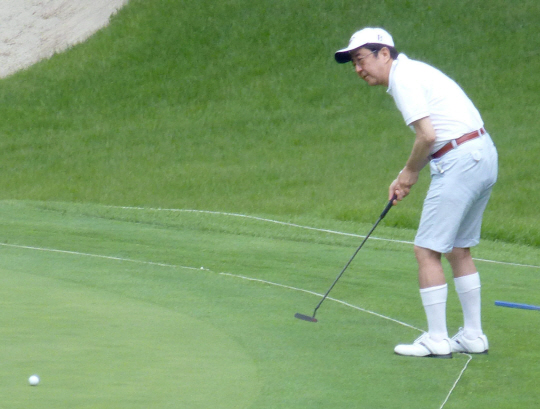 |
Japanese Prime Minister Shinzo Abe putts at a golf course in Yamanashi Prefecture on Aug. 16, the day after he made a statement for the 70th anniversary of Japan’s surrender to end World War II. Abe will be on summer vacation until Aug. 20. (Kyodo News/Yonhap) |
[2015.8.17] [News analysis] After Abe's statement, Pres. Park inching closer to Japan
평통사
view : 1130
Park seems to be working for some kind of diplomatic achievement as she enters the second half of her term
During President Park Geun-hye’s address on Aug. 15, marking the 70th anniversary of Korea’s liberation from Japan, she said, “Though many difficulties remain, now is the time to move together into a new future based on a correct understanding of history.” Park effectively reaffirmed her “two-track” strategy of separating historical disagreements from issues related to defense and the economy.Along with the diplomatic fears that South Korea will be excluded from the multilateral framework that will be forming in Northeast Asia this fall if Park does achieve improved currently strained relations with Japan, analysts also see this as a strategic move aimed at achieving concrete diplomatic results as Park enters the second half of her time in office.Her remarks hint at a wide gap between Park’s attitudes and the attitudes of the public, however. While the average South Korean feels hostility toward the statement made by Japanese Prime Minister Shinzo Abe on the 70th anniversary of Japan’s surrender in World War II, Park has tried to put a positive spin on it, refraining from criticism when possible and only saying certain parts were “unsatisfactory.”During her speech on Saturday, Park acknowledged that many parts of Abe’s statement would be “no small disappointment" from South Korea’s point of view. At the same time, she chose to “focus on the fact that Japan has made clear to the international community that there will be no changes to statements of past cabinets that have expressed remorse and apologies for the pain Japan caused the former comfort women and for the injury and pain that its wars of aggression and colonial rule inflicted on the people of various Asian countries.”Even though South Koreans voiced criticism immediately after Abe‘s statement that Abe had not apologized for colonial rule or made any new apologies, Park was instead relaxing the hardline stance she has previously held toward Japan.Prior to this, Park has strongly urged Japan to confront its problematic past. During a speech on Mar. 1, 2013, Park said, “The historical perspective of aggressor and victim cannot be changed, even though a thousand years pass by.”In the past, Park had brought the comfort women to the foreground of South Korea’s historical dispute with Japan, but during her speech on Saturday, she only asked the Japanese government to “find a swift and appropriate resolution” to the issue.Some analysts think that Park’s speech could provide a glimpse into the future of her foreign policy toward Japan. They point to a sense of crisis about South Korea’s isolation in Northeast Asian diplomacy, which has been increasing as the ongoing historical debate brings South Korea’s relations with Japan to their lowest point.Some argue that there is nothing left that the Park administration can do to Japan. Indeed, South Korea’s diplomatic options are severely limited because of external factors, including the rise of China, the efforts of the US to form a trilateral alliance with South Korea and Japan to check China, and concerns about South Korea’s diplomatic isolation following the thaw in relations between China and Japan, which became noticeable at the end of last year.“Park has begun the second half of her presidency, but relations with North Korea are at an all-time low and she has little diplomatic achievements to speak of. The resulting sense of crisis appears to have played a role. [The speech] can be seen as laying the groundwork for a summit with Japan,” said Yang Gi-ho, professor at Sungkonghoe University.Some analysts think that, during Park’s visit to China this September, which is almost sure to materialize, she will try to build momentum for improving relations with Japan, perhaps through a summit with the leaders of China and Japan. By Choi Hye-jung and Kim Oi-hyun, staff reportersPlease direct questions or comments to [english@hani.co.kr]english.hani.co.kr/arti/english_edition/e_international/704737.html



